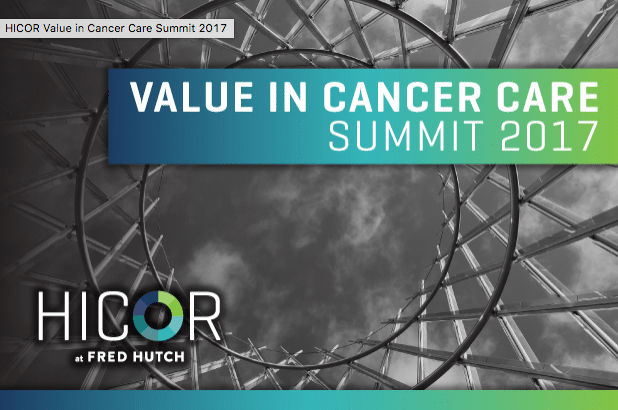
The Hutchinson Institute for Cancer Outcomes Research (HICOR) recently held its annual Value in Cancer Care Summit which brought providers, patients and payers together to talk about challenges to overcome and opportunities to improve in cancer care. It was a day full of thought provoking discussion about the shift to value-based care, ways to make cancer treatment more affordable, what survivorship really is, how our system can care for the patient beyond the clinic and ways data can be used to improve the delivery of care.
One recurring theme throughout the day was the importance of collaboration. Many speakers encouraged everyone involved in the delivery of cancer care to help others learn from their successes and be open to learning from others. It was really heartening to hear a room full of stakeholders acknowledging the importance of working together. Treating cancer is too important and too complex to do it alone.
There is a lot going on in the current landscape of healthcare. New legislation, MACRA, is meant to address the unsustainable growth of cancer costs, but it’s complex and it requires practices to do things they’ve never done before like collect and analyze large data sets. Experimental value-based payment models, like the Oncology Care Model, are underway and success will be measured by lowering the cost of very high quality care. These and other factors make it even more important for practices to not only learn from their own experiences, but also to learn from other practices that may be succeeding in an area where their practice may not be as strong.
Another complexity that was discussed was helping the patient with more than just their medical treatment. Patients are dealing with all sorts of other issues – financial, emotional, physical and more and there is an opportunity to change the care team to support all of the patient’s needs – so that treatment is not only between the patient and their physician, but also supported by triage nurses, social workers, navigators, dieticians and others.
It was fitting that the day wound down with a plenary talk by Dr. Ray Page, who described how his practice has undergone a complete transformation in an effort to deliver care that really is patient-centered. Dr. Page spoke about the pilot programs his clinic, the Center for Cancer and Blood Disorders (CCBD), has participated in to test value-based delivery models and how they’ve found that continuous practice transformation efforts paired with technologies and systems that enable better management of patients, early intervention and reduced hospitalizations have made the biggest difference.
CCBD is certainly a great example of a practice that has looked for external partnerships and looked to other successful practices to learn and identify ways to improve. As Dr. Page said, it’s time to make technical and cultural changes to get ready for the future and to deliver really great care in an affordable way. We have been fortunate to also partner with CCBD and have truly enjoyed watching their practice transform, embrace change and make a difference in patient’s lives.
While the big challenges in cancer care haven’t been solved yet, we left the Summit inspired by the spirit of collaboration and transparency and will continue to work to deliver software and services to enable this new model of coordinated and comprehensive cancer care.
To learn more about the work HICOR is doing, visit their website today. If you would like to learn more about Navigating Cancer, contact us today.
